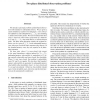Free Online Productivity Tools
i2Speak
i2Symbol
i2OCR
iTex2Img
iWeb2Print
iWeb2Shot
i2Type
iPdf2Split
iPdf2Merge
i2Bopomofo
i2Arabic
i2Style
i2Image
i2PDF
iLatex2Rtf
Sci2ools
106
click to vote
ACSD
2005
IEEE
2005
IEEE
Two-Phase Distributed Observation Problems
We introduce and study problems of distributed observation with bounded or unbounded memory. We are given a system modeled as a finite-word language L over some finite alphabet Σ and subalphabets Σ1, ..., Σn of Σ modeling n distinct observation points. We want to build (when there exist) n observers which collect projections of a behavior in L onto Σ1, ..., Σn, then send them to a central decision point. The latter must determine whether the original behavior was in a given K ⊆ L. In the unbounded-memory case, observers record the entire sequence they observe. In the bounded-memory case, they are required to be finitestate automata. We show that, when L is trace-closed with respect to the usual dependence relation induced by Σ1, ..., Σn, unbounded-memory observability is equivalent to K being centrally observable and trace-closed, thus decidable. When L is not trace-closed, the problem is undecidable, even if K and L are regular. We also show that boundedmemory observabil...
Related Content
| Added | 24 Jun 2010 |
| Updated | 24 Jun 2010 |
| Type | Conference |
| Year | 2005 |
| Where | ACSD |
| Authors | Stavros Tripakis |
Comments (0)

